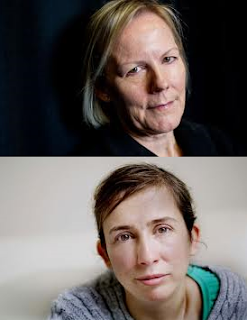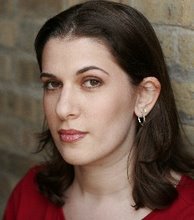Remember the Ladies...(there are a few of them...)
It is part of my annual Oscar tidings to note the female filmmakers who contributed to the nominated films, and to cinema in general.

Annie Mumolo and Kristen Wiig are nominated for Best Original Screenplay for Bridesmaids; Wiig of course is also the star of the film, and Mumolo made a cameo appearance (pictured above right.) I wasn't thrilled with the overall quality of Bridesmaids, but I think it's no coincidence that while the weakest aspects of the film involved clumsy romance, the strongest aspects were the warm and honest moments of female friendship. This film, if nothing else, was a refreshing antidote to the "cat-fight" sub-genre. The ladies in this film struggle with societal pressures of femininity and success, and sometimes take out their frustrations on each other, but ultimately they see each other as allies instead of enemies, and value those alliances higher than some stupid purple dress.

Bridget O'Connor wrote the screenplay for Tinker Tailor Soldier Spy with her husband, Peter Straughan, and sadly, it was her final project. She died of cancer in 2010, just before filming began. She was posthumously nominated by the Academy, and she and Straughn were just voted the BAFTA (the British Oscar) for Best Adapted Screenplay. Their script is astonishing, structured to reveal only fragments of the mystery for maximum suspense, and to convey entire back-stories and subplots in just a few short images, often without dialogue. The story, however, (from the novel by John LeCarre), has only the most marginal of female characters.

That's it for women nominated for storytelling awards. The Iron Lady is the only film nominated for a major award this year that is directed by a woman: Phyllida Law (above, top), who previously directed Meryl Streep in Mamma Mia!. The film was written by Abi Morgan (above, bottom.) Law and Morgan acknowledge that the audience probably dislikes Margaret Thatcher as a politician, but trust we are still capable of empathy for a character struggling with the double-standards for women in politics. Thatcher (as depicted in the film) is criticized for speaking too loudly, for being too bossy, for being too sure of her own opinion...characteristics that would not be criticized in a male politician, and characteristics that are crucial for any politician's success, especially one faced with shattering the glass ceiling. This film never rises above the familiar formula of the biopic, but it did have one nice moment I appreciated: Early in the film, young Margaret warns her potential fiancee that she will never be a housewife -- "I cannot die washing a tea cup -- " and in the final scene of the film, Margaret finds herself at the sink, rinsing out that very item. There is no flashback to her youthful declaration, no dwelling soliloquy with the piece of china, just a fraction of a glance as she moves on to do other things.

Only one other film in the major categories had female authorial contribution: Glenn Close and Gabriella Prekop were two of the four screenwriters on Albert Nobbs. This film takes an interesting look at gender roles: Albert (or whatever her name was before she assumed her alias) is woman who disguised herself a man to get a job. She also dreams of owning her own shop, and she could never save enough money to someday become her own boss on a woman's salary. And she falls in love with women. Albert lives in a society where everything she desires is only acceptable for men, and she has assumed the role of a man so thoroughly that she has forgotten who she really is. It's not hard to argue that Albert isn't a true transsexual: This is most apparent in the scene where she tries on a dress for the first time in decades, and is genuinely startled by how freeing it is to take even a tiny, superficial step closer to her truer self. It makes you want to swoop Albert away from her time and place, and drop her off in present day Massachusetts, where she could marry a nice lady without wearing a costume, and together they could run a wine shop or something.

There's not much else in the remaining films of 2011. I really want to see We Need to Talk About Kevin (directed and co-written by Lynne Ramsay, above left) and Young Adult (written by Diablo Cody, above right), but unfortunately I can't get to them in time for this writing. I did see Meek's Cutoff (directed by Kelly Reichardt, above center), which was the most disappointing of all the films of 2011 I saw. A fictional story inspired by true events along the Oregon Trail, this could have been a gripping, you-are-there tale of psychological unraveling. Unfortunately, Reichardt takes minimalist filmmaking to its worst extremes -- the dialogue is unintelligible, the characters' faces are nearly always in darkness, obscured, or out of frame -- which suffocates the human drama. It's unfair of me to be more disappointed when a film directed by a woman fails, considering the countless films I've seen directed by men that began with noble intentions but fell apart in the execution. Such is the case when there are so few films directed by women in the first place.
I hope this post is longer next year!


0 Comments:
Post a Comment
<< Home